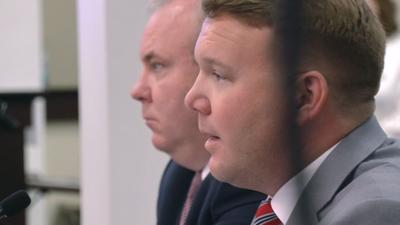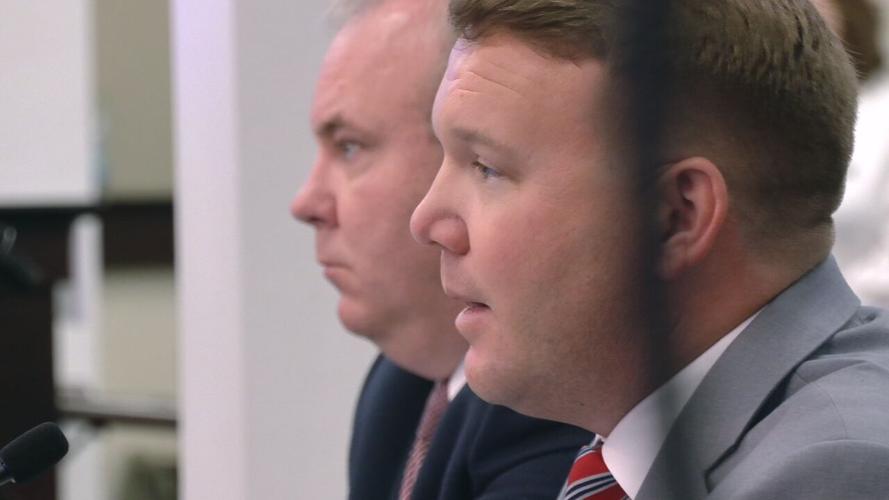FRANKFORT, Ky. (WDRB) -- Kentucky lawmakers on Friday discussed a proposal they said is designed to tackle crime in Kentucky.
The Safer Kentucky Act is set to be filed at the beginning of the 2024 session, which begins next month. It's a more than 20-point proposal focused on crime at many levels. Rep. Jared Bauman, R-Louisville, shared the latest details of the proposal Friday in front of a committee of fellow lawmakers.
"We face an epidemic of crime in our hometown and we continue to see record rates of homicides in urban and rural areas across the state," Bauman said.
Bauman outlined details of the proposal, which include:
- Targeting violent persistent felony offenders -- "Three Strikes Law"
- Requires life without probation or parole for those convicted of their third violent felony
- Removing early release for criminals using guns in crime
- Prevents a person from being eligible for probation, parole, conditional discharge, conditional release, or any other form of release prior to the completion of their sentence if, in the commission of the offense, they used a firearm which was possessed in a violation of state law, including firearms which are stolen or defaced.
- Requiring parents to attend juvenile court hearings
- If a violation occurs, a person shall be fined up to $500 and ordered to participate in up to 40 hours of community service
- Enhancing the penalty for fentanyl delivery causing overdose death
- Death by delivery constitute murder for an individual who knowingly sells fentanyl or a fentanyl derivative to another person when the injection, ingestion, inhalation, or other introduction of the fentanyl or fentanyl derivative causes the death of such person
- Adds trafficking of fentanyl to a Class B felony, if the death of the victim occurs
- Adds manslaughter to the violent offense statute
- Creating a Kentucky Statute for carjacking
- Establishes the crime of carjacking in the commonwealth
- Makes carjacking a Class B felony
- Increasing penalties for vandalism
- Changes the felony amount of vandalism damage to $500
- Allows for charges to be a Class B misdemeanor if the defendant, prior to trial, effects repair or replacement of the damaged property; or makes complete reimbursement in the amount of the damages
- Increasing the penalty for smuggling contraband in detention facility
- Increases the felony class for smuggling contraband substances within a jail, prison, or other type of detention center to a Class B felony
- Substances such as fentanyl, carfentanil, and fentanyl derivatives.
- Increases the felony class for smuggling contraband substances within a jail, prison, or other type of detention center to a Class B felony
- Modifying rules on auction of confiscated murder weapons
- Allows ordinary citizens (without Federal Firearms License) to bid at Kentucky State Police (KSP) auctions with provision that any murder weapon they purchase will be destroyed by KSP
- Prevents the use of any taxpayer funds in bidding on confiscated murder weapons.
- Combatting street camping to improve rights of property owners
- Imposes a band on street camping on pubic streets, sidewalks, paths, or public areas normally used by pedestrians and/or vehicles, private property, homes, or businesses in any way
- Provides that property owners shall not be held criminally liable for any actions taken to defend themselves from the aggressive actions of a person refusing to vacate an illegal street camp, and any such aggression by the camper can be prosecuted as assault
- Authorizes local control by allowing local governments to designate indoor or outdoor areas separate from public areas for camping. They must provide for basic sanitation needs.
- Improving protocol for involuntary confinement of the mentally ill
- Eases requirements to enable mentally ill accused criminals to receive treatment
- Removes the requirement of a demonstrated history of criminal behavior to qualify for involuntary confinement.
- Supports successful re-entry for those leaving incarceration
- Requires the Transportation Cabinet to issue a personal identification card or operator's license for an eligible felony offender released after serving his or her sentence
- Currently, the Transportation Cabinet only does this for those released from state facilities
- Requires the Transportation Cabinet to issue a personal identification card or operator's license for an eligible felony offender released after serving his or her sentence
- Madelynn's Law regulating bail funding organizations
- Prevents charitable organizations from furnishing bail of $5,000 or more
- Makes it unlawful to furnish bail regardless of the amount for a violent offense or for a person being held under a civil court order or warrant pursuant to Casey's Law
- Requires photo identification for any person who posts bail
- Requires a charitable bail organization to maintain and make an annual report to the legislature and make it publicly available on the organization's website
- Creating Kentucky Statute for the murder of a first responder
- Allows a prosecutor to seek the death penalty or life in prison if there is evidence to show that a first responder was intentionally killed while in lawful performance of their duties
- Requires offender to pay compensation to family of the victim.
- Reforming the parole board
- Requires a unanimous vote of three to six-member panels to approve parole
- Allows for a two-thirds vote of the membership of the full board to approve parole
- Strengthening shopkeeper's privilege
- Allows employees and business owners to use a reasonable amount of force necessary to protect themselves, to prohibit the escape of a person detained for theft, or to prevent the loss of goods for sale
- Provides civil and criminal immunity for the worker and business owner
- Increasing penalties for attempted murder
- Increases the penalties for those who are convicted of attempted murder to require them to serve a minimum of 85% of their sentence before they are eligible for early release
- Adds attempted murder to the violent offense statute
- Protecting places of business from threats of mass violence
- Broadening the terroristic threatening statute to include the workplace
- Addressing threats or plans of violence intended to target schools
- Requires a school employee who knows or has reasonable cause to believe that a person has made threats or plans of violence which are intended to target a school or students or who knows that a firearm is present on school property, shall immediately report the matter to law enforcement
- Hardening sentences for adults using juveniles as criminal accomplices
- Provides that any person over the age of 18 years of age who engages in a criminal conspiracy with a minor shall be charged one level higher than the level provided for the offense
- Cracking down on drive by shooters
- Increases the penalty for wanton endangerment in the first degree to a Class C felony, if the person discharges a firearm in the commission of the offense
- Adds this provision to the violent offense statute
- Updating witness intimidation statute
- Adding harassing communication to the witness intimidation statute.
- Harassing communications such as telephone, mail, or any form of electronic or written communication in a manner which causes annoyance or alarm and serves no purpose of legitimate communication.
- Adding harassing communication to the witness intimidation statute.
- Reducing recidivism
- Requiring those granted parole to participate in group violence intervention
Improving protections for victims of domestic and dating violence - Increasing penalties for people who repeatedly violate orders of protection to a Class D felony
- Requires regular evaluations of state programs designed to support re-entry and reduce recidivism
- Jake's Law cracking down on a person fleeing the police
- Increases the penalty for fleeing or evading the police to a Class C felony
- Prevents the defendant from being released on probation, shock probation, conditional discharge, or parole until he or she has served at a minimum of 50% of their sentence
"The simple truth is that the criminal element has become an all too normal part of our world today," Bauman said during the discussion Friday.
Rep. Lindsey Burke, D-Lexington, and Nima Kulkarni, D-Louisville, expressed concerns over various aspects of the proposal.
"What this bill does, it sets up a system where if you're poor, you're going to have a worse time, and that's already what's happening," Burke said. "We need to do better."
She specifically mentioned the section about parents showing up with their children when juveniles are in court.
"Think about who doesn't show up," Burke said. "Those are the people who are working minimum wage jobs who are going to get fired. So if you take them out of work for a week, they're going to be looking for another job and you know what's going to happen? They're not going to be able to monitor their kids. So that's not a solution."
Bauman said he and other lawmakers have worked with other groups on this proposal and will continue working with stakeholders on the Safer Kentucky Act.
"It is our job to provide the strongest and most effective policy possible to hold criminals accountable for their actions," he said.
The upcoming Regular Session will begin in January.
Related Stories:
- Kentucky lawmakers announce 18-point plan to curb violent crime
- Greenberg backs aspects of Kentucky lawmakers' crime-fighting proposal
- Kentucky lawmakers push for death penalty updates despite a stay against further executions
- Kentucky lawmakers eye street camping ban in crime plan as advocates push for homelessness solutions
Copyright 2023 WDRB Media. All Rights Reserved.














